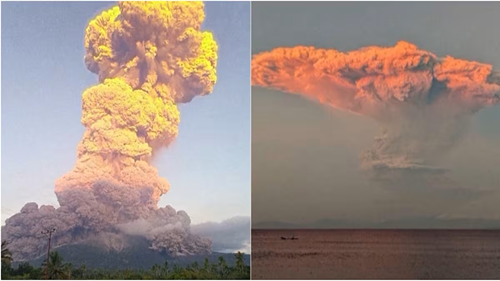Mount Lewotobi Laki-Laki in Indonesia erupted violently on June 17, sending a towering ash column rising over 11 kilometers into the sky. The eruption, which occurred without significant warning, has prompted local authorities to initiate evacuations and issue safety advisories for nearby residents.
The eruption has also caused major disruptions to air travel. Bali-bound flights have been temporarily grounded due to the ash cloud, which poses serious risks to aircraft engines and visibility. Authorities are monitoring the situation closely and coordinating with aviation officials to ensure passenger safety.
Residents in the surrounding areas have been urged to evacuate immediately if they are within the designated danger zones. Emergency services and disaster management teams are on high alert, providing aid and temporary shelter for affected communities. People are advised to wear masks to avoid inhaling volcanic ash and to stay indoors where possible.
Experts describe this eruption as a stark reminder of nature’s immense power. Volcanologists continue to monitor seismic activity in the region to predict potential further eruptions or lava flows. Authorities are also using early-warning systems and satellite imagery to track the ash cloud’s movement and issue timely updates to the public.
Indonesia, part of the Pacific “Ring of Fire,” is home to numerous active volcanoes, making monitoring and preparedness a critical part of disaster management. This latest eruption highlights the importance of community awareness, rapid response systems, and international cooperation in managing natural disasters.
Residents and travelers are urged to stay informed through official channels and adhere strictly to evacuation guidelines to ensure safety.







